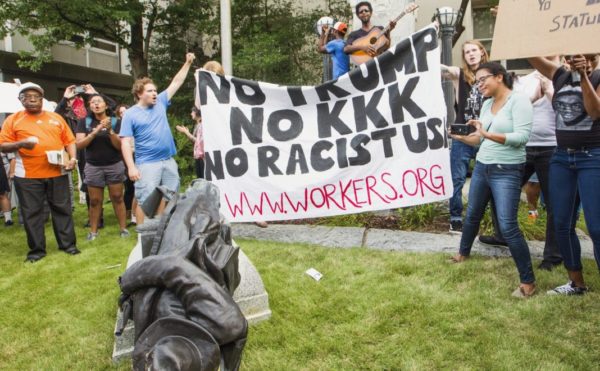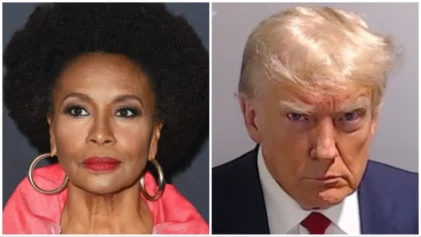
Protesters celebrate after toppling a statue of a Confederate solder in Durham, N.C. Monday, Aug. 14, 2017. Activists on Monday evening used a rope to pull down the monument outside a Durham courthouse. The Durham protest was in response to a white nationalist rally held in Charlottesville, Va., over the weekend. (Casey Toth/The Herald-Sun via AP)
The election of Donald Trump ushered in an era of heightened racial anxiety. His election triggered an immediate wave of violence against African-Americans and other nonwhites. The rise in racially motivated hate crimes has continued well into his first year in office. Beyond physical violence, the past year has also included a seemingly high amount of anti-Black rhetoric, much of it coming from the White House. It’s no wonder that most Americans believe that race relations have gotten worse since January 2017.
In such distressing times, it would be reasonable for someone to think that Black people would be grateful for the assistance of white allies.
Such a supposition would be quite wrong.
In 2017 alone, an ocean of articles flowed forth advising, cajoling, critiquing, criticizing, praising, and dismissing white allies. After reviewing what was written last year, it seems that saying Black people are disappointed in the current state of white allyship is an understatement on par with calling the Grand Canyon a ditch.
The reasons for distress are too numerous to name, but there is a common theme. Some Black activists believe that there is no place for whites in the struggle for Black liberation. Others see a role, albeit a limited one. Some Black people are weary of being asked to tell white people how to be allies, especially when that information is readily accessible. Others are upset about the fact that some whites will don a safety pin in solidarity and expect to be treated as if they had led the raid on Harpers Ferry.
A brief review reveals many reasons for and levels of frustration with white allies, but there are some common threads. The first thread is distrust. Many Black people ask if there really can be such a thing as a white ally. Audre Lourde said, it is impossible to tear down the master’s house using the master’s tools. If this is so, is it foolhardy to ask the master’s children to help in this task? Can it ever succeed if they are included? Or, are they the best equipped to lead to the weaknesses in the foundation or show escape routes when necessary?
Moreover, many Black people feel that those who call themselves allies either have suspect motives or still have huge racial blind spots. Although they’d likely refer to themselves as allies, the white organizers of the Women’s March on Washington designed to protest the Trump inauguration were criticized for failing to realize that Black women and other nonwhite women might be interested in their project even though 94 percent of Black women supported Trump’s opponent compared to 43 percent of white women. Additionally, longtime liberal Bill Maher created a minor fracas in 2017 when he used the n-word on his HBO show. When there is a disconnect between the stated beliefs of white allies and their actions, the actions will always be the focus for people of color.
The second common thread is a feeling that when white allies are included, the focus shifts. For example, when a white person asks how to be an ally at a time when a Black person is distressed, the focus is no longer on the Black person but is placed on the white person. While this is an example of a white person acting intentionally, white people benefit from privilege even when they are not actively trying to. Some argue that a white person’s very presence changes the nature of conversations in racial justice spaces. After being raised in a society that encourages whites to step to the forefront, are they prepared to follow rather than lead? In a nation that prioritizes white emotions, are they able to put theirs to the side to prioritize others? The success of any true white ally or white resistance group will likely depend on how successfully they can navigate not only recognizing or “checking” their privilege but actively shutting down that privilege in nonwhite spaces.
The question then becomes is it possible to overcome centuries of distrust and privilege for white to help blacks work toward justice? Although there are a myriad of articles telling white people how to be allies, some suggestions inspired by 2017 events come to mind.
1. Sweep Around Your Own Front Door
The best advice to white allies is not from 2017, but from 1965. Malcolm X dealt with this issue in his autobiography. In the book, he recalls meeting a young white college student who asked him what a sincere white person could do for social justice. He dismissed her by saying, “Nothing.” However, later in the book, he reflected on the event and said that if he’d had it to do over, he’d have said the following:
I know that every time that whites join a black organization, you watch, pretty soon the blacks will be leaning on the whites to support it, and before you know it a black may be up front with a title, but the whites, because of their money, are the real controllers.
I tell sincere white people, ‘Work in conjunction with us—each of us working among our own kind.’ Let sincere white individuals find all other white people they can who feel as they do—and let them form their own all-white groups, to work trying to convert other white people who are thinking and acting so racist. Let sincere whites go and teach non-violence to white people!
In this brief passage, Malcolm argues that working separately is the best way for white allies to be effective. Although the notion might appear to be far-fetched, it seems this tactic is slowing gaining traction in social justice movements. Just last year, a white-allies-only march was held in St. Louis, Missouri. White allies and Black activists in Tennessee and South Carolina agree that whites should take a larger role in the protest movement.
The argument is not that one-race protests should be the new wave in every instance. They may not always be practical or necessary. However, the idea is that white bodies are valued in a way that Black ones are not. As such, this is a good way for white people to use their privilege in service of the cause: they can draw attention to issues without (necessarily) risking life and limb as Black protesters might. Additionally, the media is likely to pay more attention to their presence.
2. Be consistent in your personal and public lives
One way to bridge the distrust is by white people making certain that the actions in their private lives are ideologically consistent. For example, this writer observed a car in her town that had two bumper stickers. One said “resist.” The other was for the NFL team from Washington, D.C. The driver of that car probably considers himself or herself an ally, any trust they have will be largely undercut by the fact that they did not or could not see the irony in putting those bumper stickers together, or worse, saw the irony and didn’t care.
This part is the most tricky, because humans are imperfect beings. Those who seek justice have an unattractive tendency to attack enemies and allies with equal vigor. If the events of 2017 should have left any lessons, it is that even a flawed white ally is better than her racist, Twitter-addicted alternative. But having said that, such a partner has to try to be the best white ally and walk the walk in every aspect of life. As is often said, “The personal is political.” In 2018 and beyond, white people will not be given passes simply for showing up. Black people are demanding more, and whites who want to be leaders in racial justice would do well to be certain their own racial houses are in order before they attempt to tell other white people how to behave.
3. Move from words to action
There were four stories that stood out in 2017 as examples for what white allies should be. Heather Heyer, the young woman killed in the Charlottesville counter-protests, dedicated her life to protest. Rev. Robert E. Lee IV, a descendant of General Robert E. Lee, left his church when the primarily white membership chastised him for speaking out against racism and supporting Black Lives Matter. Stephanie McKellop, a teaching assistant at the University of Pennsylvania was asked not to teach this semester after she disclosed that she chose to call on Black women first, other nonwhites second, white women, and then white men. The Redneck Revolt is a group of white “anti-racist, anti-fascist” who are not only working to organize poor whites, but also provide protections for marchers of color at justice events.
The thing that these groups or individuals have in common is that they have sacrificed their time, money, careers, talents, and sadly, even Ms. Heyer’s life, in service to the cause. Each saw something they could do and they did it. But in each case, their desire for justice went beyond merely saying something and transitioned into doing something. From organizing others to creating a just learning environment, each of these stories shows that it is possible to make a difference. There are white people willing to put their livelihoods and lives on the line for change.
Though not every person can or should risk their life, racial justice is not a passive process, but an active one. White people should be willing to act in service of their goals, not merely think or talk about them. (Unless, of course, they happen to be talking to other white people to educate them about racism!)
4. Be patient with Black people
Black people are emotionally raw right now. Although the election of 2016 could be given a lot of blame for this angst, in truth, the current mood likely started at the time Trayvon Martin was killed. African-Americans are skeptical. They’re hurt. They’re angry. To different degrees, to be certain, but it is likely true for all but the very young, the very clueless, or both.
This feeling of anger is likely to persist for a while. Moreover, for the reasons stated, Black folks did not feel completely supported by white allies in 2017. So, interracial work could be fraught with tension for the near future. However, the struggle for justice is one that must be fought on many fronts.


